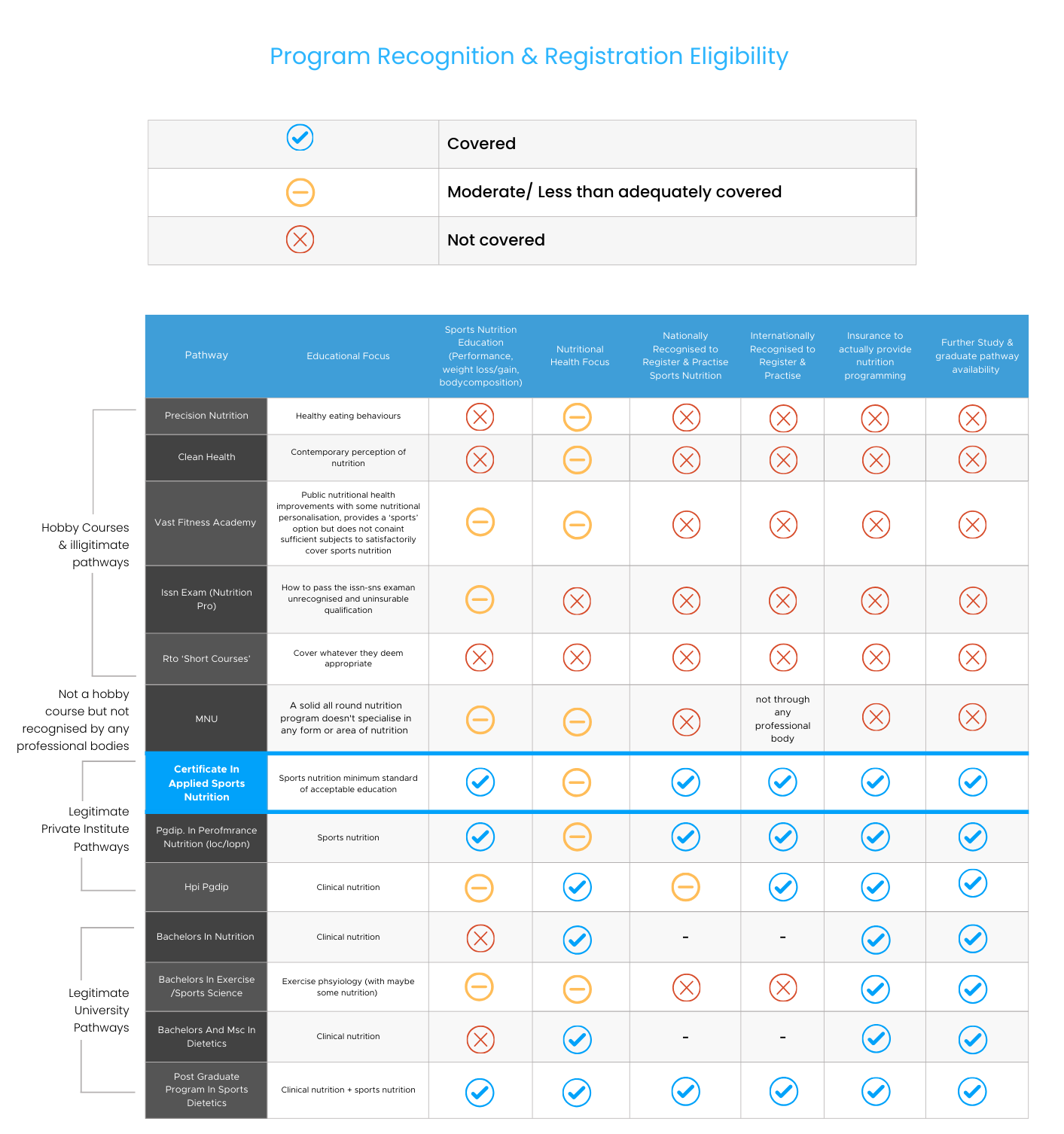Registration
After completing a relevant prior degree or the Certificate in Applied Sports Nutrition you are eligible to register with the Sports Nutrition Association as an Accredited Sports Nutritionist. You then also become eligible to insure yourself for sports nutrition programming, meal plans, and supplement program for your clients.
This is the only non-dietetic pathway to become eligible to legitimately access insurance to cover those activities, please refer to the Body’s latest Insurance and Registration Position Statement for any more information. Registration as a Sports Nutritionist is A$599/year. This can be paid upfront or on a monthly payment plan.
Continued education is extremely important however there are no extra CEC or CEU programs that we require our professional members to complete. It is our belief that with our members continuing education is a mutual responsibility, so to keep you up to date with the content and actually receive something for your registration fees, we invest in the future of our members.
Providing course refreshers to our members every 6-months, and CPD annually. For members who deregister, reinstatement of registration is available and the reinstatement process is assessed on a case by case process, with fees ranging from A$899 to a full re-enrolment in the certificate depending on the period of time they were unregistered.
Insurance
We recommend partnering with Arthur J Gallagher as they are the only insurer who works with us on CPD audit compliance, a high priority for insurance being valid.

Educational Providers, Programs, & Pathway Accreditation Validity within Australia, USA, UK and NZ.

Accreditation Eligibility
This covers the above and the nutrition for Personal Trainers programs that range from 1/2 day CEC (fitness) Seminars/Courses through to, 3-month programs. These are often (but not always) centred around weight management through behaviours. Depending on the program 0 -1 subjects of the certificate will be eligible for credit.
Programs inclusive of this, such as but not limited to Recomp and GPNI, have merit via their ISSN inclusion, but are fixed systems that only allow education within said platforms. I.e. muscle increases with ‘x’ weight on your 1rm deadlift, and nutrient timing is essential for all hypertrophy. Rather than educating the mechanics of how these things work, and other physiological processes via in-depth foundational education thus creating a reliance on these fixed systems. The ISSN component can be assessed to receive 0-1 subjects of credit for the certificate program.
Are fixed programs like those mentioned above, but do not include the background education from the ISSN Journal, nor any measurable assessment like the ISSN exams. These are not recognised, and hormonal manipulation of nutrition, or somatotype nutrition is not a part of an Accredited Sports Nutritionists’ scope, or any other entry-level allied health or fitness professional for that matter. These programs receive no credit.
Is not an accredited university (unlike the name implies), but is a private education provider and provides a very solid framework for global nutrition education. It covers many topics effectively at a fundamental level. It covers some sports, general population, and even some chronic disease. Unfortunately, because it is so broad and does touch on chronic disease intervention, in most regions the minimum requirement for any registered professional to work with chronic disease is a 4-year bachelor degree. The Sports Nutrition education is not in-depth enough to meet the minimum compliance required for registration as an Accredited Sports Nutritionist. Graduates receive 3 subjects credit into the certificate from MNU.
Depending on the university you study at and how you major, these programs provide in-depth education and clinical practise in specialist population management of nutrition. This mainly focuses on Chronic Disease prevention and sometimes treatment (depending on the degree and level). Some Sports Nutrition electives are available but vary in the learning outcomes of the program. Graduates of these programs are commonly eligible to register as Nutritionists (but not always), however, sports and body composition are not included in their covered activities. As such, further specific study is required. Graduates of these programs receive 30-70% credit for the certificate based on academic transcript assessment against the 12 subjects required for registration.
These are graduates of the Masters in Dietetics University Programs within Australia. They are registered with the DAA (Dietitians Association of Australia) and are covered for all populations and clinical treatment of specific chronic disease. Like the undergraduate health science nutritionists, sports subjects as electives are the only option to sports specific study during the program so education here may be limited. Total study time of 5 years full-time.
These are dietitians who have completed their master’s program and have since spent 2 years educating themselves in the field of Sports Nutrition, a total study time of 7-8 years full-time. This is the highest level of accreditation.
Is the entry-level qualification that provides provisional accreditation (which lasts for up to 3 years) for those members without a relevant health science or sports science tertiary degree (either a Gdip or Bachelors as a minimum). It thoroughly covers the foundations of Applied Sports Nutrition Practise, with no clinical aspects of chronic disease treatment & management, while providing thorough training on the screening referral triage process to allied health specialists where health risk is present. For those students with no prior study, in order to achieve full accreditation they are required to enrol into either a graduate diploma program or relevant university program. The body has been fortunate enough to provide this provisional timeline to allow its members to establish experience practising and thus enabling them to ascertain whether or not this is a long term career for them without accruing tens of thousands of dollars in student loans, or committing to years of study before finding out this isn’t the career path for them.
NB* All graduates of the Certificate are guaranteed entry into the IOPN Graduate Diploma Program.
Is the complete level of the minimum standard for full accreditation as an Accredited Sports Nutritionist. These programs are extensively thorough in their specific coverage of Sports Performance, body composition, and energy availability metabolism. These programs and institutes are of the highest calibre in Sports Nutrition internationally but do not provide any clinical expertise in treating or managing chronic disease. Individuals who complete either of these programs receive close to full credit with 1-2 subjects required to be completed for registration requirements.
Frequently Asked Questions
The short answer is no.
Sports Nutritionist (processing), and Accredited Sports Nutritionist are protected terms that in a professional setting carry with them defined liability and responsibility for best practise and duty of care.
- Eligible for the Sports Nutrition insurance product from Gallagher (in relevant regions)
- Use of the trademarked title – Accredited Sports Nutritionist
- Public listing on the Sports Nutrition Registry
- Twice yearly course update access including yearly continuing professional development (CPD) ($5200AUD)
- Discounts on Eric Helms Muscle and Strength Pyramids (42% off)
- Member prices on association events, seminars, functions and conferences (50% off)
- Free resources for TDEE, EA and Health Risk Assessment
Annual registration is $599AUD upfront or 12 x monthly payments of $59.99AUD.
Each year in the month of October the Association holds it’s Annual CPD month & member audits. During CPD (Continuing Professional Development) the
Association provides the members with access to the most up-to-date Certificate program, and assesses the member’s; comprehension on a portion of
the lectures, application via a case study, and compliance via risk assessment audits. There is also a non assessed refresher in the month of May
If you are no longer practicing as an Accredited Sports Nutritionist (personalised & prescriptive nutrition services, calories, nutrition coaching, macros etc.) then you simply need to go through the de-registration process via your member account which is created when registering.
The last thing we want is for people who are not actually practising to be maintaining registration.
Deregistration is processed at the end of your 12-month registration period. So for those on a monthly option when the 12-month period of your monthly registration is complete it is then processed.
Reinstatement fees for those wishing to start practicing again apply after deregistration as well.
A duty of disclosure on an insurance policy refers to the obligation of the policyholder to provide complete and accurate information to the insurance company when applying for or renewing an insurance policy. This duty requires the policyholder to disclose all relevant facts that could influence the insurer’s decision to accept or price the policy.
The duty of disclosure typically applies to material facts, which are details or information that could reasonably influence the insurer’s assessment of the risk involved in providing coverage. Material facts may include the policyholder’s personal information, previous claims history, the nature of the property or asset being insured, or any other relevant information that the insurer requests.
By disclosing all material facts, the policyholder helps the insurance company accurately assess the risk and determine appropriate terms, conditions, and premiums for the policy. Failure to fulfil the duty of disclosure, such as intentionally withholding or providing false information, may have serious consequences. It could lead to the policy being voided, claims being denied, or the policyholder being subject to legal and financial repercussions.
It’s important for policyholders to be diligent and thorough when fulfilling their duty of disclosure to ensure a transparent and valid insurance contract. If there are any doubts about what information should be disclosed, consulting with the insurance company or seeking professional advice can help clarify the requirements.
E.g. In the nutrition space the precedence to ensure that you are suitably qualified to provide individualised nutrition services is an undergraduate degree at a level 7 or above on the qualifications framework (see here). Having registration with a professional body can also sustain this duty of disclosure.
